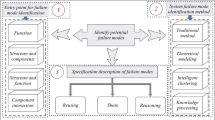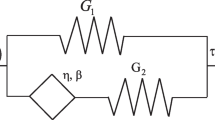Abstract
Reliability analysis using first-order reliability methods (FORM) has been widely used in reliability-based design optimization (RBDO) due to their simplicity and efficiency. The performance of the RBDO is highly dependent on how it deals with the loops of deterministic optimization and reliability analysis as well as the process of reliability assessment. In this paper, sequential optimization and reliability analysis (SORA) is employed to reduce the computational cost of RBDO. Moreover, a double-step modified adaptive chaos control method (DS-MACC) based on an improved adaptive chaos control approach is developed to speed up the reliability analysis loop. In the method presented here, two sets of novel criteria are introduced within two steps to distinguish the condition of the iterative process, compute and modify the step size. The efficiency and robustness of the proposed method is shown with eight inverse reliability problems and five RBDO examples and is compared with some methods developed recently. The results illustrate that the proposed method is more efficient with a competitive convergence rate.

















Similar content being viewed by others
References
Aoues Y, Chateauneuf A (2010) Benchmark study of numerical methods for reliability-based design optimization. Struct Multidiscip Optim 41(2):277–294
Du X, Chen W (2004) Sequential optimization and reliability assessment method for efficient probabilistic design. J Mech Des 126(2):225–233
Gong J-X, Yi P (2011) A robust iterative algorithm for structural reliability analysis. Struct Multidiscip Optim 43(4):519–527
Hao P, Wang Y, Liu C, Wang B, Wu H (2017) A novel non-probabilistic reliability-based design optimization algorithm using enhanced chaos control method. Comput Methods Appl Mech Eng 318:572–593
Hao P, Ma R, Wang Y, Feng S, Wang B, Li G, Xing H, Yang F (2019) An augmented step size adjustment method for the performance measure approach: toward general structural reliability-based design optimization. Struct Saf 80:32–45
Hasofer AM, Lind N (1974) Exact and invariant second-moment code format. J Eng Mech-Asce 100:111–121
Jeong S-B, Park GJ (2017) Single loop single vector approach using the conjugate gradient in reliability based design optimization. Struct Multidiscip Optim 55(4):1329–1344
Kang Z, Luo Y, Li A (2011) On non-probabilistic reliability-based design optimization of structures with uncertain-but-bounded parameters. Struct Saf 33(3):196–205
Keshtegar B (2016a) Chaotic conjugate stability transformation method for structural reliability analysis. Comput Methods Appl Mech Eng 310:866–885
Keshtegar B (2016b) Stability iterative method for structural reliability analysis using a chaotic conjugate map. Nonlinear Dyn 84(4):2161–2174
Keshtegar B (2017a) A hybrid conjugate finite-step length method for robust and efficient reliability analysis. Appl Math Model 45:226–237
Keshtegar B (2017b) A modified mean value of performance measure approach for reliability-based design optimization. Arab J Sci Eng 42(3):1093–1101
Keshtegar B, Chakraborty S (2018a) Dynamical accelerated performance measure approach for efficient reliability-based design optimization with highly nonlinear probabilistic constraints. Reliab Eng Syst Saf 178:69–83
Keshtegar B, Hao P (2018b) A hybrid descent mean value for accurate and efficient performance measure approach of reliability-based design optimization. Comput Methods Appl Mech Eng 336:237–259
Keshtegar B, Lee I (2016c) Relaxed performance measure approach for reliability-based design optimization. Struct Multidiscip Optim 54(6):1439–1454
Keshtegar B, Miri M (2014) Introducing conjugate gradient optimization for modified HL-RF method. Eng Comput 31:775
Keshtegar B, Hao P, Meng Z (2017c) A self-adaptive modified chaos control method for reliability-based design optimization. Struct Multidiscip Optim 55(1):63–75
Keshtegar B, Baharom S, El-Shafie A (2018c) Self-adaptive conjugate method for a robust and efficient performance measure approach for reliability-based design optimization. Eng Comput 34(1):187–202
Lee JO, Yang YS, Ruy WS (2002) A comparative study on reliability-index and target-performance-based probabilistic structural design optimization. Comput Struct 80(3–4):257–269
Li M, Wang Z (2020) Deep learning for high-dimensional reliability analysis. Mech Syst Signal Proc 139:106399
Li M, Wang Z (2022) Deep reliability learning with latent adaptation for design optimization under uncertainty. Comput Methods Appl Mech Eng 397:115130
Li G, Meng Z, Hu H (2015) An adaptive hybrid approach for reliability-based design optimization. Struct Multidiscip Optim 51:1051–1065
Liu P-L, Der Kiureghian A (1991) Optimization algorithms for structural reliability. Struct Saf 9(3):161–177
Melchers RE, Beck AT (2018) Structural reliability analysis and prediction. John wiley & sons, New York
Meng Z, Li G, Wang BP, Hao P (2015) A hybrid chaos control approach of the performance measure functions for reliability-based design optimization. Comput Struct 146:32–43
Meng Z, Li G, Yang D, Zhan L (2017) A new directional stability transformation method of chaos control for first order reliability analysis. Struct Multidiscip Optim 55(2):601–612
Rackwitz R, Flessler B (1978) Structural reliability under combined random load sequences. Comput Struct 9(5):489–494
Rashki M, Miri M, Moghaddam MA (2014) A simulation-based method for reliability based design optimization problems with highly nonlinear constraints. Autom Constr 47:24–36
Roudak MA, Shayanfar MA, Barkhordari MA, Karamloo M (2017) A robust approximation method for nonlinear cases of structural reliability analysis. Int J Mech Sci 133:11–20
Roudak MA, Shayanfar MA, Karamloo M (2018) Improvement in first-order reliability method using an adaptive chaos control factor. Structures 16:150–156
Santos S, Matioli L, Beck A (2012) New optimization algorithms for structural reliability analysis. Comput Model Eng Sci 83(1):23–55
Shayanfar MA, Barkhordari MA, Roudak MA (2018) A new effective approach for computation of reliability index in nonlinear problems of reliability analysis. Commun Nonlinear Sci Numer Simul 60:184–202
Wang Z, Wang P (2013) A maximum confidence enhancement based sequential sampling scheme for simulation-based design. J Mech Design 10(1115/1):4026033
Wang L, Liu Y, Liu D, Zhangming Wu (2021) A novel dynamic reliability-based topology optimization (DRBTO) framework for continuum structures via interval-process collocation and the first-passage theories. Comput Methods Appl Mech Eng 386:114107
Wang L, Liu Y, Li M (2022) Time-dependent reliability-based optimization for structural-topological configuration design under convex-bounded uncertain modeling. Reliab Eng Syst Saf 221:108361
Wu Y-T, Millwater H, Cruse T (1990) Advanced probabilistic structural analysis method for implicit performance functions. AIAA J 28(9):1663–1669
Yang D (2010) Chaos control for numerical instability of first order reliability method. Commun Nonlinear Sci Numer Simul 15(10):3131–3141
Yang D, Yi P (2009) Chaos control of performance measure approach for evaluation of probabilistic constraints. Struct Multidiscip Optim 38(1):83–92
Yang M, Zhang D, Jiang C, Han X, Li Q (2021) A hybrid adaptive kriging-based single loop approach for complex reliability-based design optimization problems. Reliab Eng Syst Safe 215:107736
Youn BD, Choi KK, Park YH (2003) Hybrid analysis method for reliability-based design optimization. J Mech Des 125(2):221–232
Youn BD, Choi K, Du L (2005) Adaptive probability analysis using an enhanced hybrid mean value method. Struct Multidiscip Optim 29(2):134–148
Zhang Y (1994) Finite element reliability methods for inelastic structures. University of California, Berkeley
Zhu S-P, Keshtegar B, Trung N-T, Yaseen ZM, Bui DT (2021) Reliability-based structural design optimization: hybridized conjugate mean value approach. Eng Comput 37(1):381–394
Funding
No funding was received for conducting this study.
Author information
Authors and Affiliations
Corresponding author
Ethics declarations
Competing interest
The authors declare that they have no conflict of interest.
Replication of results
The MATLAB codes for the current study are available from the corresponding author on reasonable request.
Additional information
Responsible Editor: Lei Wang
Publisher's Note
Springer Nature remains neutral with regard to jurisdictional claims in published maps and institutional affiliations.
Rights and permissions
Springer Nature or its licensor holds exclusive rights to this article under a publishing agreement with the author(s) or other rightsholder(s); author self-archiving of the accepted manuscript version of this article is solely governed by the terms of such publishing agreement and applicable law.
About this article
Cite this article
Ilchi Ghazaan, M., Saadatmand, F. Decoupled reliability-based design optimization with a double-step modified adaptive chaos control approach. Struct Multidisc Optim 65, 284 (2022). https://doi.org/10.1007/s00158-022-03390-y
Received:
Revised:
Accepted:
Published:
DOI: https://doi.org/10.1007/s00158-022-03390-y




